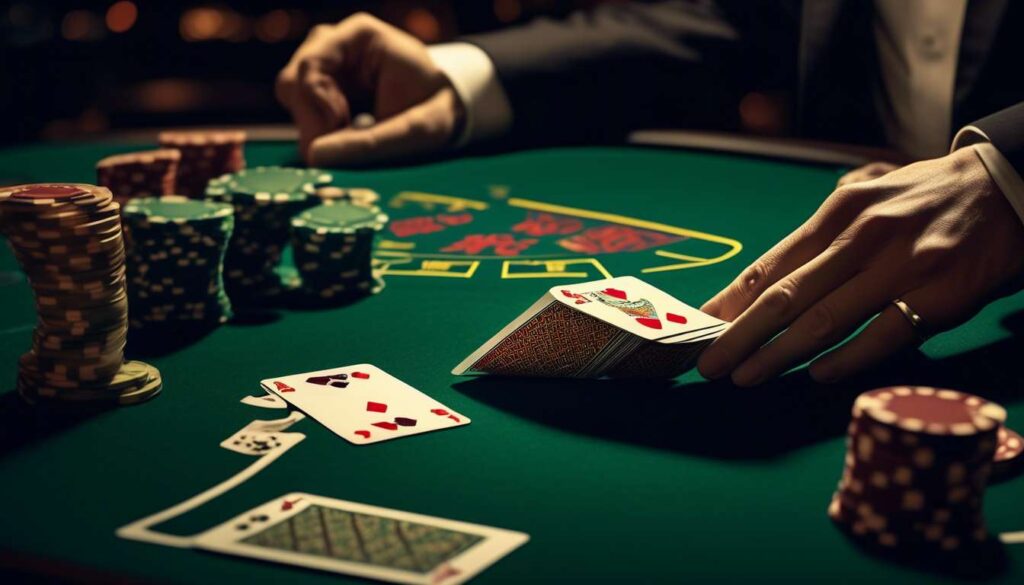When we gather around the blackjack table, the thrill of the game courses through our veins, each card flip bringing us closer to that elusive 21. As seasoned players and novices alike, we’ve all faced the moment when the dealer offers insurance against a potential blackjack.
The question that looms is whether taking this side bet is a wise decision or merely a tempting illusion. In our exploration of blackjack insurance, we will delve into the mechanics of this option, weighing the odds and strategies that come into play.
Together, we’ll uncover the truths and misconceptions surrounding insurance bets, examining the mathematics and psychology involved.
As we navigate the world of blackjack, our goal is to determine whether insurance is a strategic move that can safeguard our chips or a gamble that tips the odds in the house’s favor.
Join us as we dissect this intriguing facet of the game.
Key Concepts:
-
Mechanics of Insurance:
- Offered when the dealer’s upcard is an Ace.
- A side bet that pays 2:1 if the dealer has a blackjack.
-
Odds and Strategies:
- Assessing card counting techniques.
- Evaluating potential outcomes versus risks.
-
Truths and Misconceptions:
- Understanding the house edge.
- Common player perceptions and myths.
-
Mathematics and Psychology:
- Probability calculations.
- Psychological factors influencing player decisions.
Our investigation will illuminate whether insurance is a sound strategy or another way the house maintains its edge.
The Mechanics of Blackjack Insurance
When the dealer’s upcard is an Ace, players can opt for blackjack insurance to hedge against the dealer having a natural blackjack. It’s a side bet that allows players to feel more secure in the game.
Insurance Bet:
- Placed at half of the original wager.
- Pays out 2 to 1 if the dealer hits a blackjack.
Considerations:
-
Odds Assessment:
- The dealer needs a ten-value card to achieve blackjack.
- There are sixteen ten-value cards in a standard deck.
-
Card Counting:
- By tracking the cards, players can better assess the likelihood of the dealer having a natural blackjack.
- This method aids in making informed decisions to enhance gameplay.
Understanding the mechanics and carefully considering the odds are crucial before deciding to place an insurance bet.
Evaluating Odds and Strategies
Evaluating Blackjack Insurance Odds and Strategies
When evaluating the odds and strategies involved in blackjack insurance, it’s essential to consider the balance between potential gains and the frequency of favorable outcomes. Blackjack insurance often appears tempting, promising a safety net against the dealer’s potential blackjack. However, the odds usually aren’t in our favor.
- The house edge increases
- We often lose more in the long run when taking insurance
Card Counting and Its Impact
Card counting can slightly alter our approach. By tracking the cards played, we can better estimate the likelihood of the dealer having a blackjack. When the deck is rich in ten-value cards, the odds of insurance being advantageous increase.
- Card counting requires practice
- It isn’t always welcome at the tables
Community Approach
As a community of blackjack enthusiasts, we strive to make informed decisions that can enhance our game experience. As we navigate these strategies together, our shared understanding helps us make choices that resonate with both our wallets and our sense of belonging in the game.
Unveiling Truths and Misconceptions
Many players mistakenly believe that taking insurance is a foolproof way to safeguard against a dealer’s blackjack, but this strategy often leads to more losses over time. We, as a community of blackjack enthusiasts, need to delve deeper into the realities of Blackjack Insurance.
Understanding the Odds and Insurance Bet:
- Insurance might seem like a safety net, but it’s essential to recognize it as a separate bet with a high house edge.
- The allure of insurance is understandable, especially when we’re caught up in the excitement of the game.
- However, the odds of the dealer having a blackjack don’t necessarily justify the insurance bet unless we’re skilled at card counting.
Card Counting Considerations:
- Card counting is a technique that can shift the odds slightly in our favor.
- It’s not foolproof or easy.
- Without card counting, taking insurance becomes more of a gamble than a strategy.
Conclusion:
- Relying on insurance without the skills of card counting can lead to potential disillusionment and losses among fellow players.
Let’s navigate this wisely together.
Mathematical Insights into Insurance
Let’s dive into the math behind insurance bets to better understand their impact on our overall blackjack strategy.
When the dealer shows an Ace, we might feel tempted to take Blackjack Insurance. It’s a side bet that the dealer has a blackjack, but the odds aren’t in our favor. Typically, the payout is 2:1, but the actual odds of the dealer having a blackjack are around 9:4. This means we’re often betting more than the risk justifies.
Improving Our Chances:
-
Card Counting:
By tracking high and low cards, we can better assess the likelihood of the dealer landing a blackjack. However, even with card counting, the advantage is minimal. -
Basic Strategy Alignment:
Insurance bets don’t align with a basic strategy that aims for long-term gains rather than short-term wins.
By understanding the math, we reinforce our sense of community in making informed choices at the table.
Psychological Factors in Decision Making
Emotional and Cognitive Influences
Many of us find that our emotions and cognitive biases often influence whether we take the insurance bet, even when the math advises against it. We feel a sense of camaraderie at the blackjack table, and in the heat of the moment, the appeal of Blackjack Insurance can seem irresistible. After all, the odds of the dealer having a blackjack feel high, especially when we see that dreaded Ace.
Loss Aversion and Group Behavior
Our brains are naturally wired to avoid losses, and the thought of losing our wager can trigger a knee-jerk reaction to seek safety. This emotional response can cloud our judgment, making us forget that statistically, Blackjack Insurance is typically not a smart bet. Yet, the desire to belong and make decisions that align with the group’s behavior can be strong.
Overcoming Psychological Factors
Even for those of us aware of card counting techniques, these psychological factors can override logical decision-making. We must remind ourselves to trust the odds and remain disciplined in our approach.
Impact of Card Counting Techniques
Incorporating card counting techniques can significantly enhance our strategic decisions at the blackjack table. We’re not just guessing; we’re calculating. By keeping track of the cards, we gain insights into the odds, allowing us to make more informed choices. This shared knowledge empowers us as a community of players, strengthening our connection through a common goal: beating the dealer.
Card Counting and Blackjack Insurance
When it comes to Blackjack Insurance, card counting becomes a crucial tool. Knowing when the deck is rich in tens and aces helps us determine if taking insurance is a wise move. Without this insight, we might fall into the trap of relying on intuition alone, which often works against us.
Mastering Techniques and Community Building
By mastering these techniques, we can improve our odds, fostering a sense of camaraderie and belonging within our group. Together, we can challenge the game, making smarter bets and decisions.
Let’s continue to refine our skills by:
- Supporting each other
- Sharing our successes at the table
This collective approach not only enhances individual performance but also strengthens our group dynamics.
House Edge: Friend or Foe?
Understanding the house edge helps us navigate the challenges of blackjack by revealing how the casino maintains its advantage. It’s crucial to recognize that the house edge isn’t just an obstacle; it’s a built-in feature of the game that ensures casinos stay in business.
When considering Blackjack Insurance, remember that it often increases the house edge, making it less favorable for players in the long run.
Odds might seem like a friend when they appear to be in our favor, but the house edge ensures that over time, the scales tip back to the casino.
That’s where card counting comes into play. By mastering this technique, we can slightly reduce the house’s advantage, aligning ourselves more closely with the odds.
By understanding these dynamics, we can make informed decisions. Let’s embrace the challenge and engage with blackjack as a community, using our collective knowledge to navigate the twists and turns of the game.
Deciphering Player Perceptions
Misinterpretation of Blackjack Insurance
Many players often misinterpret the value and risks of insurance in blackjack, leading to skewed perceptions that affect their gameplay decisions. Blackjack insurance is often thought of as a safety net, but in reality, it’s more complex. The odds aren’t always in our favor, and taking insurance can feel comforting, yet it often proves costly in the long run. This misconception stems from a desire to protect our hands, overlooking the house edge that insurance inherently carries.
Impact of Card Counting
When we factor in card counting, the narrative shifts a bit. Card counting can provide more insight into the game’s odds, allowing us to make informed decisions about taking insurance. However, not all of us are skilled card counters, and relying solely on this strategy can be risky.
Striving for Understanding
To make smarter choices, we should strive to understand the statistical realities of blackjack insurance. By doing so, we’ll forge a deeper connection with the game and each other. Understanding these nuances helps us make better gameplay decisions and enhances our overall enjoyment of the game.
Conclusion
In conclusion, when it comes to blackjack insurance, it’s essential to weigh the odds and strategies carefully.
While some may view it as a smart bet, others may see it as a risky move. By considering the following factors, players can make more informed decisions:
- Mathematical Insights: Analyze the probability and expected value of taking insurance.
- Psychological Factors: Understand how emotions can influence decision-making.
- Impact of Card Counting: Assess how card counting can affect the decision to take insurance.
Ultimately, the house edge plays a significant role, and deciphering player perceptions can lead to a better understanding of the game.

